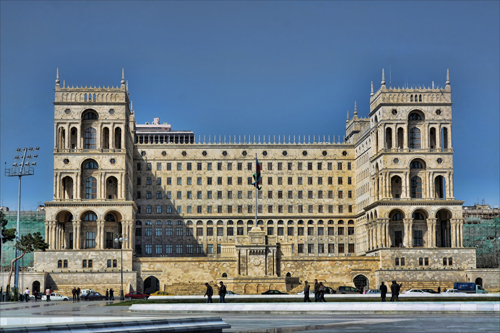Azerbaijan
Officially the Republic of Azerbaijan is the largest country in the Caucasus region with an area of 86,600 km2 (33,436 sq mi) located at the crossroads of Western Asia and Eastern Europe. It is bounded by the Caspian Sea to the east, Russia to the north, Georgia to the northwest, Armenia to the west and Iran to the south. The exclave of Nakhchivan is bounded by Armenia to the north and east, Iran to the south and west, while having a short borderline with Turkey to the northwest. The population of Azerbaijan is over 9.3 million people. Today Azerbaijan is divided into 10 economic regions; 66 districts or rayons and 77 cities of which 11 are under the direct authority of the republic. Moreover, Azerbaijan includes the Autonomous Republic the exclave of Nakhchivan. The President of Azerbaijan appoints the governors of these units, while the government of Nakhchivan is elected and approved by the parliament of Nakhchivan Autonomous Republic. Azerbaijan The word is translatable as "The Treasury" and "The Treasurer" of fire or "The Land of the Fire" in Modern Persian.
Azerbaijan has an ancient and historic cultural heritage, including the distinction of being the first Muslim-majority country to have operas, theater and plays. The Azerbaijan Democratic Republic was established in 1918, but was incorporated into the Soviet Union in 1920 as the Azerbaijan Soviet Socialist Republic. Azerbaijan regained independence in 1991. Shortly thereafter, during the Nagorno-Karabakh War, neighboring Armenia occupied Nagorno-Karabakh, its surrounding territories and the enclaves of Karki, Yukhary Askipara, Barkhudarly and Sofulu. The Nagorno-Karabakh Republic emerged in Nagorno-Karabakh after the ceasefire of 1994 and is not diplomatically recognized by any other state. As such, the region, effectively independent since the end of the war, is considered de jure a part of Azerbaijan.
Azerbaijan is a unitary constitutional republic. It is one of the six independent Turkic states, being an active member of the Turkic Council and the TÜRKSOY community. The Constitution of Azerbaijan does not declare an official religion, and all major political forces in the country are secular nationalist, but the majority of people and some opposition movements adhere to Shia Islam. It has a high economic development and literacy, as well as a low rate of unemployment and intentional homicide. Main economic sectors are energy (oil and natural gas), agriculture, and tourism. Two thirds of Azerbaijan is rich in oil and natural gas.
Baku
Baku is the capital and largest city of Azerbaijan, as well as the largest city on the Caspian Sea and of the Caucasus region with population of over 2 million. Baku is located 28 metres (92 ft) below sea level, which makes it the lowest lying national capital in the world. Baku is also the largest city in the world located below sea level. It is located on the southern shore of the Absheron Peninsula, which projects into the Caspian Sea. The city consists of two principal parts: the downtown area and the old Inner City (21.5 ha). Baku is divided into eleven administrative districts and 48 townships. Among these are the townships on islands in the Baku Bay and the town of Oil Rocks built on stilts in the Caspian Sea, 60 km (37 mi) away from Baku. The Inner City of Baku along with the Shirvanshah's Palace and Maiden Tower were inscribed as a UNESCO World Heritage Site in 2000. According to the Lonely Planet's ranking, Baku is also among the world's top ten destinations for urban nightlife. The city is the scientific, cultural and industrial center of Azerbaijan. The first written evidence for Baku dates to the 1st century CE. World famous places of Baku are Caravanserai, Maiden Tower, Shirvan Shahs Palace, and many more.
Sumgayit
Sumgayit is one of the largest cities in Azerbaijan, located near the Caspian Sea, about 31 kilometers (19 miles) away from the capital, Baku. Population of the city is over 300 000, making it second biggest city of Azerbaijan. The city has a territory of 83 square kilometers (32 sq mi). It was founded on November 22, 1949. Two settlements are within the city administration: Jorat and Haji Zeynalabdin, a settlement named after oil businessman and philanthropist Haji Zeynalabdin Taghiyev. It is home to Sumqayit State University.

